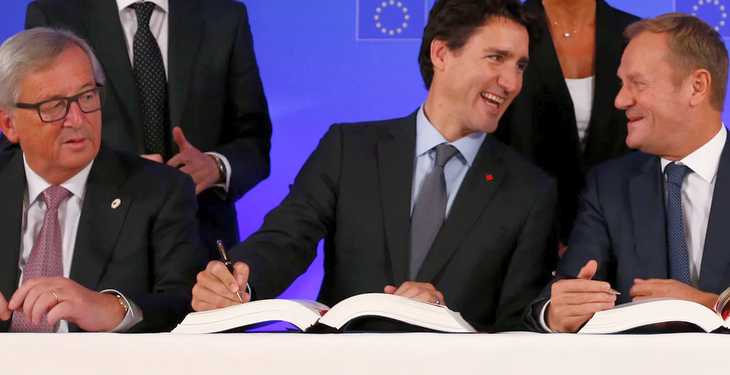The European Union and Canada have signed a long-delayed landmark trade deal, which removes 99% of tariffs – and officials hope it will generate an increase in trade worth $12bn (€10.9bn) a year.
After the agreement was signed in Brussels the Canadian Prime Minister Justin Trudeau said: “Canadians and Europeans share the understanding that in order for real and meaningful economic growth, we need to create more good, well-paying jobs for our citizens. Progressive trade agreements like the one signed today, will do just that.”
European Commission President Jean-Claude Juncker referred to “a new chapter” in relations between the EU and Canada, which would open new opportunities “more than half-a-billion people on both sides of the Atlantic”.
The agreement, whose signing comes after seven years of negotiations, has to be approved by all EU national and regional parliaments in order to become definitive.
Canada has a new economic opening to 500 million Europeans. The EU believes this proves it can do big trade pacts which are good for its citizens. For example, €500 million is the estimated amount that EU exporters would save in duties annually.
Access for European businesses to public contracts in Canada
Energy is one of the key sectors of the CETA alongside financial services, telecommunications, maritime transport, fisheries, environmental issues and agriculture.
With CETA, EU companies will be able to bid for public contracts in Canada at all levels of government. For the first time this will include the provincial authorities, responsible for a large share of Canada’s public spending. Every year, Canada’s federal government, provinces and municipalities buy goods and services worth over €30 billion from private companies.
European businesses will be the first foreign companies to get that level of access to Canadian public procurement markets as no other international agreement concluded by Canada offers similar opportunities.
Canada will also create a single electronic procurement website that combines information on all tenders to ensure that the EU companies can take advantage of these new opportunities.
